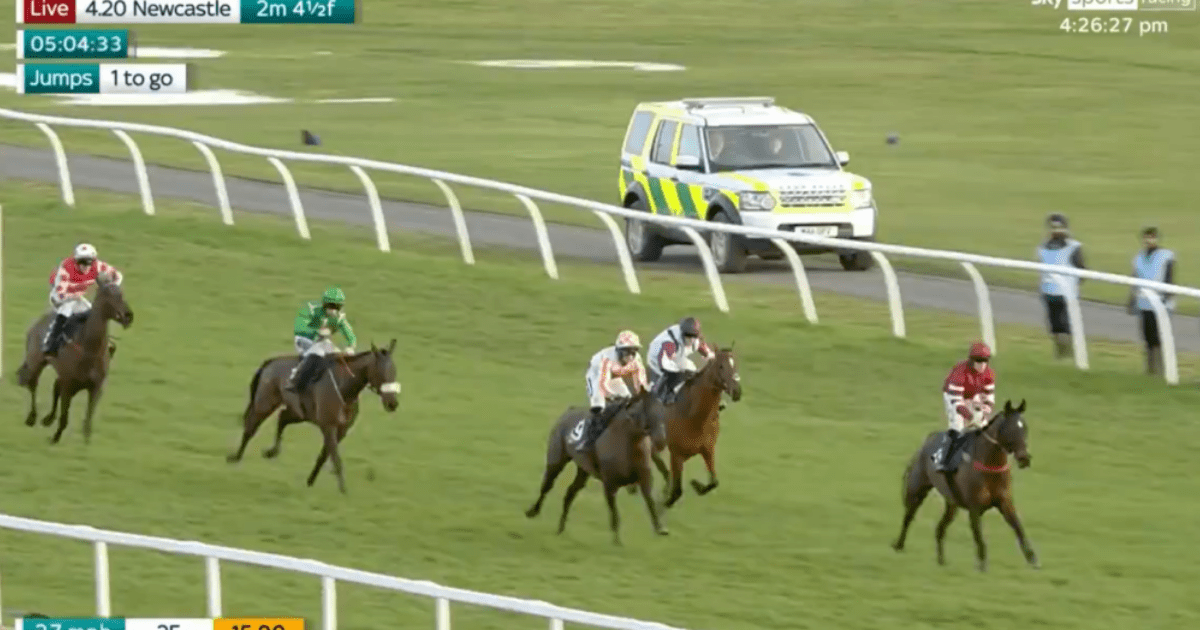Heartbreaking Finish
In a devastating turn of events, a Newcastle race was declared void with just one fence to go after an awful incident on the track. The race came to a sad end following the fatal injury of one runner, Line In The Sand.
Quick Action Taken
Officials swiftly stopped the race as a member of the groundstaff waved the flag signaling jockeys to pull up immediately. Sky Sports Racing's Andrew Thornton reported on the heartbreaking situation that unfolded during the 4.20pm race at Newcastle.
Tragic Outcome
Line In The Sand, trained by George Bewley and ridden by Jonathon Bewley, sadly suffered a fatal injury. Despite the favorite, Glory Hights, looking set to win, the race was abandoned to prevent further injuries to horses or jockeys.
A Race Cut Short
With just one jump to go, the race was declared void, leaving the victory hanging in the balance. Greenhill Gardens, ridden by Patrick Wadge, was still in contention, but the race was ultimately rendered meaningless due to the tragic passing of Line In The Sand.

Frequently Asked Questions
How can a horse be determined to be fit for a race before it starts?
A horse’s fitness before a race is assessed through a combination of veterinary checks, trainer observations, and performance in workouts. Vets look for signs of injury and ill-health, while trainers observe their response during training sessions. The horse’s behavior in the lead-up to the race can also provide insights into its readiness to compete.
How do handicaps work in horse racing?
In horse racing, handicapping is used to equalize the field and give each horse a fair chance of winning. Horses are assigned different weights based on their past performances, with the perceived better horses carrying more weight. This system is designed to balance the competition and is a critical aspect to understand for those betting on races.
How do betting odds work in horse racing?
The odds of winning a horse race bet reflect the probability that a specific outcome will occur. These odds can be presented in decimals or fractions to show the possible profit of a winning bet. The odds can change based on how much money is wagered for each horse. This can happen up to the start of the race. A seasoned bettor will watch these changes to make informed wagers.
What are the major horse racing events?
The Triple Crown of Thoroughbred Racing, which includes the Kentucky Derby and Preakness Stakes in the United States is one of the most celebrated events in horseracing. Dubai World Cup is a race that has a lot of international recognition. Other races are the Prix de l’Arc de Triomphe (France), Royal Ascot (United Kingdom), and Melbourne Cup (Australia). These prestigious racing events draw the world’s best jockeys, horses, and trainers.
What does the bloodline of a horse mean in racing terms?
The bloodline of a racehorse is enormously significant as it indicates the inherited traits passed down from its ancestors, which may include speed, stamina, and temperament — all critical factors in racing success. Breeders will often look at the horse’s pedigree in order to predict its future and match stallions up with mares who have desirable characteristics.
Statistics
- Horse racing events in the United Kingdom draw in a yearly attendance of over 6 million people.
- Horse racing is known to support roughly 1.4 million full-time jobs in the United States alone.
- The Melbourne Cup, Australia’s most prestigious horse race, sees an average attendance of over 100,000 spectators each year.
- There are over 9.2 million horses in the United States, with a significant portion of these bred for the purpose of racing.
- The Kentucky Derby, one of the most watched horse racing events, has attracted over 150,000 spectators in a single event.
External Links
ascot.co.uk
equibase.com
bloodhorse.com
nhra.com
kentuckyderby.com
How To
How to Pick the Right Horse in Horse Racing for Betting
Start by looking at the statistics of the horse and jockey in the race program. Consider looking for consistent good performances in recent races. Assess the class levels the horse has raced at and whether it’s moving up or down in class. Consider how the track condition can influence the performance of a race horse. Watch the horse’s behavior in the paddock and during the warm-up – a calm, focused horse can indicate readiness to perform well. Finally, consider the odds as a reflection of how the betting public views the horse’s chances, but trust your own analysis.

